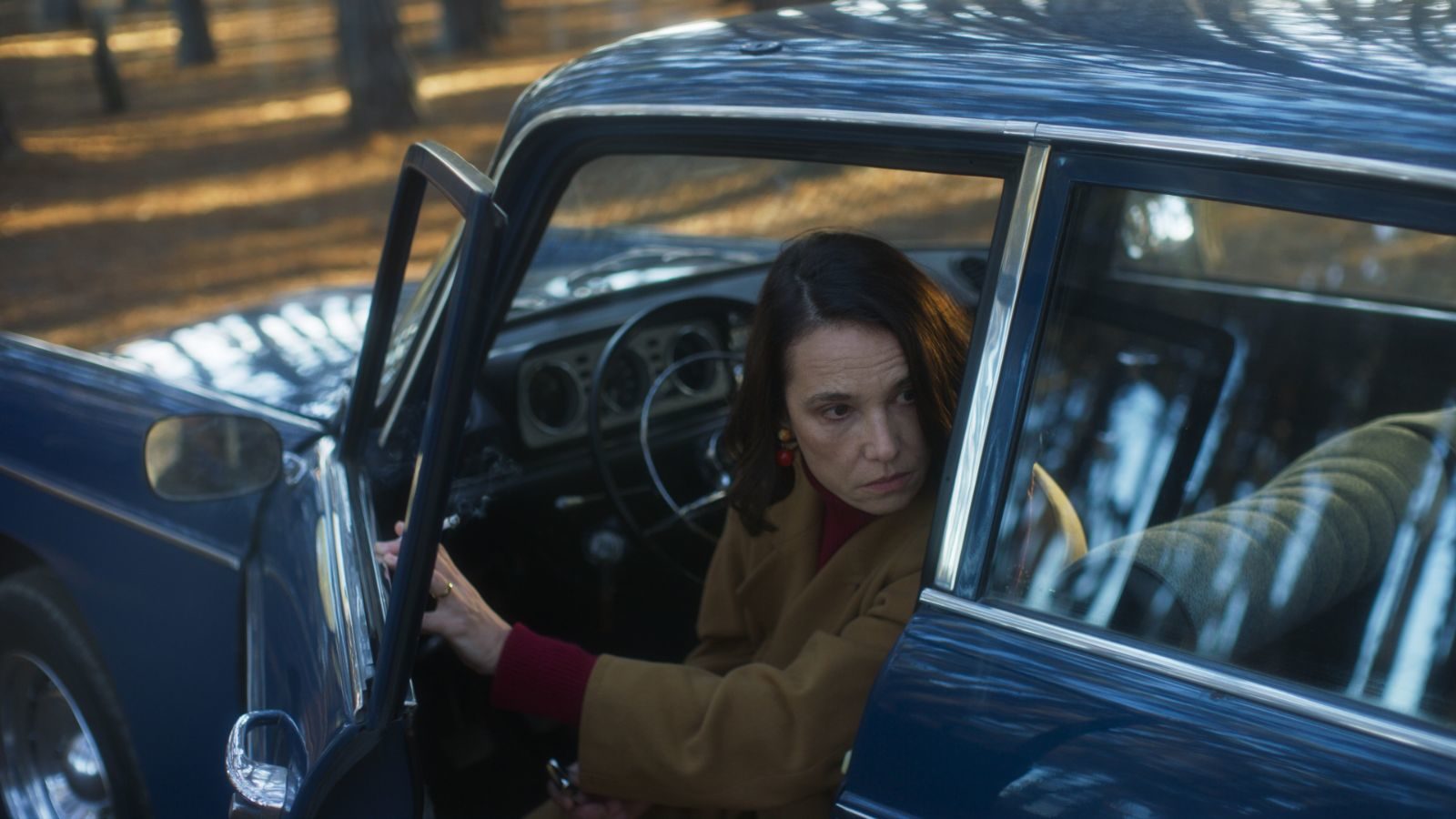
ND/NF Review: Chile ’76 is a Strong Debut Examining Turbulent History with a Narrow Focus
Manuela Martelli’s debut film opens with a sequence that perfectly captures the tone and themes Chile ‘76 will explore. Carmen (played by Aline Kuppenheim) is at a paint shop, choosing and mixing the color that she’ll use at the beach house she has with her husband, a shift head at one of the most important medical institutions in Santiago, Chile’s capital. While browsing an almanac with pictures of European cities, pointing at colors of sun-kissed buildings, we can hear a disturbance outside: a woman is being pulled over by the military and yells as she’s taken away.
At the same time as we hear the woman shouting her name and ID, a drop of pinkish paint falls from the mixer onto Carmen’s elegant, pristine shoe. When Carmen leaves the store, cans of paint in the hands of the vendor helping her, we glimpse the aftermath of what happened. As she approaches her car Carmen sees a woman’s shoe, ragged and dirty, on the street right beside the driver’s door. Carmen just looks at it for a second before kicking it under the car, hiding the shoe from sight.
It’s 1976 and Chile is living through one of the most turbulent times in its history: a bloodthirsty dictatorship led by Augusto Pinochet, the military, and right-wing politicians. And, like most people, Carmen doesn’t know much about the atrocities that are happening. As in the opening scene, everything seems to happen outside the frame, which helps with the sensation of oppression Martelli weaves into Carmen’s story.
Carmen leaves for her beach house with her maid, where big renovations and constructions are happening, but she seems out of it, needing sleeping pills to finally rest. She’s visited by a local priest with whom she volunteers constantly and who asks for her help: a man is hurt and can’t go to the hospital. The priest tells her the man is another priest who was caught stealing and thus can’t go to the hospital, lest he be sent to the police or military. This man has been shot in the leg, and Carmen can tend to his wounds due to her experience volunteering for the Red Cross. It’s obvious that Carmen is being lied to and that she’s treating someone who’s fighting the dictatorship this priest is sheltering.
Slowly but surely Carmen starts to get more involved, even as she feigns ignorance regarding what’s happening. Here is where Kuppenheim’s performance shines: we see her in that ambivalence, making up lies to her husband and other people to get medical supplies, while at the same time continuing to live a privileged life that silently begins to crack.
Martelli crafts a meticulous piece of storytelling, every image carefully thought-out with regards to the inner turmoil rattling Carmen’s life. Events that happened outside the frame start peering in––for example when the body of a young woman washes ashore, something that gets covered-up by press but we know is part of the crimes against humanity this dictatorship was committing at the time.
That turmoil is reflected in the sound design, which puts the silent Carmen in the middle of the frame as conversations, the sounds of the works being done at her house, and speeches on TV by Pinochet start saturating and flood scenes as they get louder while she keeps her stoic face.
Carmen eventually feels she’s being followed while she starts using secret codes and names to communicate with the resistance that wants to know how their wounded combatant is feeling. It all goes back to that opening scene: everyone thinks they might ignore what’s going on, but eventually everyone will get spilled.
While the music, composed by Mariá Portugal, is a bit anachronistic, it feels right as the movie progresses into a more tense ordeal, recalling modern spy and thriller films. That happens at the same time as the framing of the character keeps getting closer to Carmen’s face and the camera starts getting shakier, less precise, and the colors less pastel (like the one being mixed in the opening scene) to darker tones.
Martelli has managed to create an accurate portrayal of that feeling of naiveté which permeated Chilean society in those years while simultaneously creating a highly metaphorical work. If not seeming slight as it approaches the end, Chile ’76 marks a strong debut and confirmation of Martelli’s strengths as an artist.
Chile ’76 screens at New Directors/New Films and opens on May 5.
Grade: B














